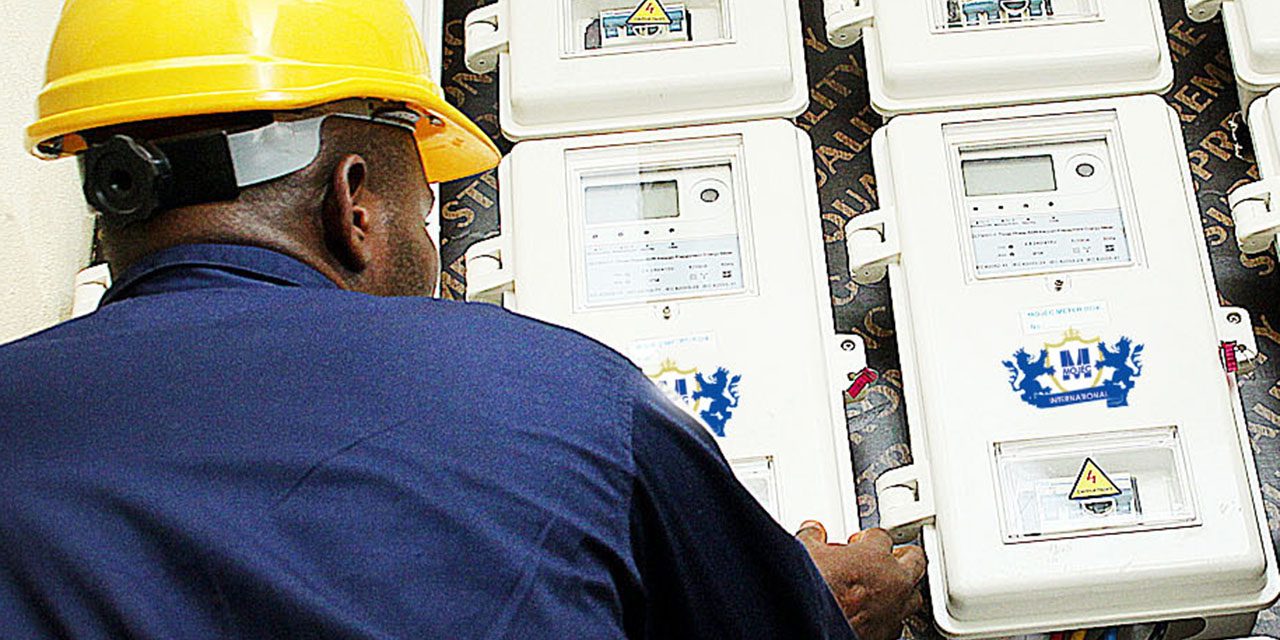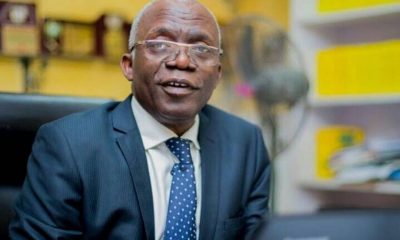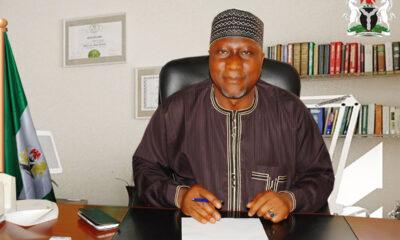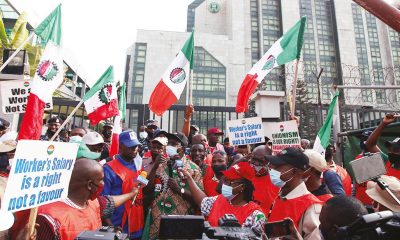Business
NERC: No electricity customer should pay more than metered neigbours

The Nigerian Electricity Regulatory Commission (NERC) says the Federal Government introduced the capping in the estimated billing for unmetered customers to ensure uniformity with their metered counterparts.
Commissioner in charge of Legal, Licensing and Compliance, Mr Dafe Akpeneye, said this at a web conference organised by PricewaterhouseCoopers (PwC), adding that the development was temporary because no customer should pay more than their metered neighbours in the same vicinity and under a similar classification.
He also said that since the Discos failed in their responsibility to meter customers, the only option was to resort to estimation.
He said, “The issue of estimated billing came about as a bridge to manage the interests of the utilities’ interest of providing power and the customers’ interest of paying for power.
“Under an ideal situation, the meter is an assurance that the utility should get paid for what it delivers and the customer pays for what he consumes. But we have found ourselves in a situation whereby when the assets were handed over, metering wasn’t a priority when the utilities were owned by the Federal Government.
“And if you look at the Nigerian demographics, with the way the population is expanding, rapid urbanisation with new connections coming to the grid, the metering of these customers has become a problem.
“One of the key requirements is for the Discos to bridge the metering gap because the problem we had to deal with was because of their inability to do that on time. We had to balance the fact that customers receive power without meter and devise a way to make sure customers have electricity without having a meter.
“Therefore, the estimated billing methodology was introduced . But that was supposed to be temporary, certain things were not done. So, estimated billing became the number one consumer complaint in the industry.”
The NERC stated that exiting the estimated billing regime is impossible for now, adding that since it is not practicable to meter everyone at once, the practice will continue for a while until the issues are resolved.
“Because we realised that meters can’t be rolled out for everyone, something had to be done to balance it out. Some measure of fair estimation had to be put in place.
“The commission developed the capping order. What this seeks to try to create is parity between metered customers and unmetered customers. So, we have someone who lives in a duplex in a certain part of town who is unmetered and we created a scenario whereby one who is unmetered does not pay more than the metered, so that they both pay almost the same thing,” he added.
In his intervention, the Director General, Bureau of Public Enterprises (BPE), Mr Alex Okoh, said the privatisation of the power sector in Nigeria remains the most ambitious of its type in Africa.
According to him, though the sector is not where it should be because of lack of investments, it has improved since it was handed over to private individuals to manage.
He said, “South Africa has 4,904 kwh per capita while Nigeria has 300kwh per capita. Now for the biggest economy in Africa, that says a lot.
“This sort of challenges prompted the bold decision to reform the power sector. So, in 2005, ESPRA was enacted and essentially was geared towards breaking the monopoly of NEPA.
“It was also to make the sector attractive. That particular action led to the unbundling to Gencos, TCN and Discos. Prior to this , electricity was generally poor. We are talking 1,500mw across the value chain.
“Post-privatisation, we have seen significant improvement and impact of privatisation of the power sector. We are just 10 years.
“There are interventions that are currently going on to correct some of the shortcomings of the privatisation exercise. Let’s not also forget that the power sector privatisation in Nigeria is perhaps the biggest privatisation programme in the continent of Africa.
“Were we rather overambitious in this privatisation. I don’t think so. Could we have taken a modulated approach to it? Maybe. But I think the decision was bold to address the lack of investment in the sector.”
In his remarks, former Minister of Power, Prof. Barth Nnaji, said government must strive to draw private sector investment to ensure sustainable supply of power.
He stated that with the right environment, the Discos can conveniently pay for power, as was shown by Eko and a few others at a point, adding that the bulk trading arrangement should be jettisoned once the Discos become credit worthy.
Auto
Luxury bus owners: Count us out of planned mass protest

Luxury bus owners: Count us out of planned mass protest
Long distance road transport owners and operators whose buses ply various routes across Nigeria have dissociated themselves from the ‘Days of Rage’ nationwide protests planned to commence on Thursday, August 1, 2024.
The transporters under their national umbrella body, Association of Luxury Bus Owners of Nigeria (ALBON), disclosed this at a press conference in the Utako area of Abuja on Thursday.
They described the planned protests as an ill wind that would blow anybody no good.
Briefing the press on ALBON’s position after a meeting in their Abuja office, the association’s leadership led by the President, Mr. Nonso Ubajaka, said experience had shown that such protests are usually infiltrated by hoodlums using the opportunity to unleash violence.
He said members reasoned that if held, the protests could lead to loss of lives and wanton destruction of properties.
He said the resolution of the members of his association had been conveyed to the Minister of Transportation, Senator Said Ahmed Alkali, making it clear that they would not be a part of the planned protests.
The association acknowledged that there is economic hardship in the country, with Nigerians feeling the impact of rising food prices and high cost of living.
The ALBON leadership, however, urged those planning to protest to have a rethink and seek more peaceful ways of getting the government to address the problems, including making themselves available for peaceful dialogue.
The ALBON president drew attention to the fact that members’ vehicles operate from Utako to other parts of Nigeria, as well as from other cities and towns to various destinations across the country, which could make their vehicles vulnerable.
Ubajaka said ALBON members could not afford to risk making their buses the targets of violent protests.
He sued for meaningful dialogue while the government works towards finding solutions to the identified problems.
He said, “We don’t want to put our businesses at risk and expose the lives of the people we serve to danger through protests.
“The government has taken steps to mitigate the several national challenges that we are having.”
He called on ALBON members to disregard the planned action, which he continually referred to as a product of “social media” resolve.
Business
Nigeria’s debt service ratio drops from 97% to 68% – Finance minister

Nigeria’s debt service ratio drops from 97% to 68% – Finance minister
Nigeria’s Finance and Coordinating Minister of the Economy, Wale Edun, on Thursday, reported a dramatic drop in the debt service ratio from an alarming 97 per cent in June 2023 to a more sustainable 68 per cent in 2024.
Addressing a press conference on the economy’s half year performance in Abuja, Edun asserted that the reduction allows the government to redirect funds to essential sectors such as infrastructure, education, healthcare, and social services, thereby improving credibility with investors and international financial institutions.
The Minister also noted a decline in Nigeria’s total debt, both domestic and foreign dollar-denominated debt fell from $181 million to $98 million, attributed to timely payments to contractors and the government’s exit from the Ways and Means financing scheme.
He added that the Federal Government’s economic policies over the past year have started yielding positive outcomes.
Edun highlighted an extraordinary 30 per cent growth in non-oil income, surpassing last year’s performance and exceeding budget expectations for the first half of 2024. He emphasized the government’s commitment to diversifying revenue sources beyond oil through robust tax reforms aimed at doubling government revenue as a percentage of GDP, from approximately 14-15 per cent to around 25 per cent.
He outlined strong measures to improve revenue collection, including technological advancements and process optimization within revenue-generating agencies. While oil revenue remains significant, its share of gross revenue has decreased to 30 per cent, down from 41 per cent during the same period last year.
READ ALSO:
- DSS recovers 2,000 bags of government-donated rice in Kastina
- DSS: There are plans to use mass protest for govt change
- INEC uncovers plan to disrupt Edo elections using ESSN operatives
To attract investments from Nigerians abroad, the Minister revealed that plans were afoot to issue a $500 million bond within the next four weeks.
The initiative aims to encourage diaspora Nigerians to bring their funds back home for investment, contributing to economic growth.
Edun acknowledged the hardships faced by Nigerians due to reform policies but assured that the benefits of these reforms will soon be realized. He stressed that President Tinubu prioritizes reducing food prices across the country and is deeply concerned about the welfare of ordinary Nigerians. After resolving transparency issues, the Cash Transfer Programme within the Social Investment initiative has resumed, recently covering approximately 600,000 beneficiaries.
He presented evidence of the economy turning a positive corner and noted that macroeconomic stability was becoming evident, with stable exchange rates, a reducing budget deficit, and a positive trade balance.
He added that investment flows are also positive, and there has been a comprehensive reconfiguration of federal finances to boost revenue and control expenditure.
Despite global economic challenges, Nigeria’s economy grew faster in the first quarter of 2024 compared to 2023. The growth was broad-based, spanning agriculture, industries, and services. Agricultural growth, which was negative in the first quarter of 2023, showed modest growth in the first quarter of 2024. The industrial sector grew seven times faster than in Q1 2023.
Edun noted that while inflation persists, the annual growth rate of inflation is slowing. Although there was a slight uptick in June due to seasonal factors, the overall trend indicates progress towards reduced inflation.
Edun concluded by expressing satisfaction with the well-coordinated fiscal and monetary policies, which are beginning to bear fruit. He emphasized that these policies are paving the way for sustained economic growth and stability, ultimately benefiting all Nigerians.
Nigeria’s debt service ratio drops from 97% to 68% – Finance minister
Business
Meta cracks down on ‘Yahoo Boys’, deletes 63,000 accounts

Meta cracks down on ‘Yahoo Boys’, deletes 63,000 accounts
Meta Platforms Inc., the parent company of Facebook, Instagram, and WhatsApp, has removed 63,000 accounts associated with the notorious “Yahoo Boys” scam group, the company announced in its Q1 2024 Adversarial Threat Report on Wednesday.
The accounts, deleted over the past few weeks, were used for financial sextortion scams and distributing blackmail scripts. Meta reported that a smaller network of 2,500 accounts, linked to around 20 individuals, primarily targeted adult men in the United States using fake identities.
Meta said it identified and disabled these accounts through a combination of advanced technical signals and comprehensive investigations, enhancing its automated detection systems.
“Financial sextortion is a borderless crime, fueled in recent years by the increased activity of Yahoo Boys, loosely organised cybercriminals operating largely out of Nigeria that specialize in different types of scams,” the social media giant stated.
It added, “We’ve removed around 63,000 accounts in Nigeria attempting to target people with financial sextortion scams, including a coordinated network of around 2,500 accounts.”
“We’ve also removed a set of Facebook accounts, Pages, and groups run by Yahoo Boys—banned under our Dangerous Organizations and Individuals policy—that were attempting to organize, recruit and train new scammers,” the company explained.
READ ALSO:
- Tinubu welcomes ex-Senate President Anyim into APC
- Customs seize vehicles illegally taking large amount of fuel to Cameroon
- Illegal petroleum storage facility discovered in Lagos
During the investigation, Meta said it found that most scammers’ attempts were unsuccessful, though some had targeted minors. These cases were reported to the National Center for Missing and Exploited Children.
Meta revealed that it also shared information with other tech companies via the Tech Coalition’s Lantern program to help curb these scams across platforms.
Further, the parent company of Facebook said it removed around 7,200 assets in Nigeria, including 1,300 Facebook accounts, 200 pages, and 5,700 groups that were providing scam-related resources.
These assets were found offering scripts and guides for scams and sharing links to collections of photos for creating fake accounts, it expounded.
Since this disruption, Meta’s systems have been actively blocking attempts from these groups to return, continually improving their detection capabilities.
The company noted that it has also been working closely with law enforcement, supporting investigations and prosecutions by responding to legal requests and alerting authorities to imminent threats.
The social media giant stated that its efforts extend beyond account removal.
“We also fund and support NCMEC and the International Justice Mission to run Project Boost, a program that trains law enforcement agencies around the world in processing and acting on NCMEC reports.
Meta cracks down on ‘Yahoo Boys’, deletes 63,000 accounts
-

 News2 days ago
News2 days agoNLC can’t withdraw from protest it didn’t organise – Ajaero
-

 News3 days ago
News3 days agoNorthern group attacks Reps Minority Caucus for demanding Nnamdi Kanu release
-

 News3 days ago
News3 days agoMinimum wage: Akpabio says domestic workers can’t earn less than N70,000
-

 News2 days ago
News2 days agoFG unveils training programme for 1,000 Nigerians in AI, blockchain
-

 International17 hours ago
International17 hours agoNetanyahu, Biden hold talks over tense Gaza ceasefire
-

 News3 days ago
News3 days agoFalana to FG: Threatening Nigerians won’t stop mass protest
-

 metro1 day ago
metro1 day agoNERDC Executive Secretary Prof Ismail Junaidu slumps, dies
-

 metro2 days ago
metro2 days agoPastor remanded for allegedly defiling teenager, attempting abortion












You must be logged in to post a comment Login